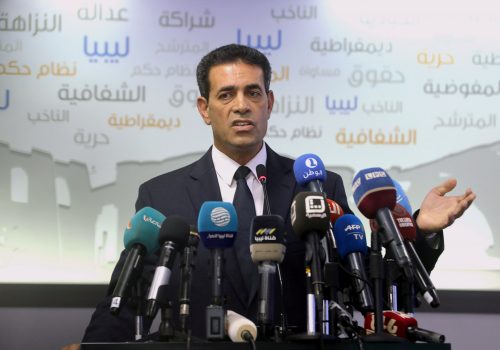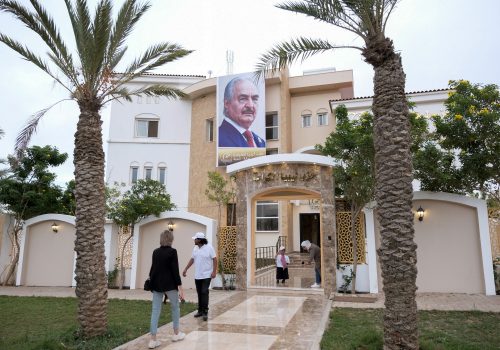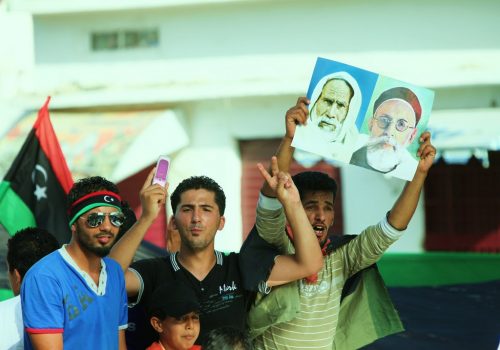At least three of Libya’s presidential candidates may not be fit for the role. Here’s who they are.
Days before the vote, Libya’s presidential elections are up in the air, with no official list of candidates presented to the public and no formal campaigning underway. The vote is scheduled for December 24 with a potential run-off in February. It would mark the first time a head of state was directly elected by 2.4 million Libyans who collected their voter registration cards.
An examination of the most controversial presidential candidates out of a crowded field of ninety-eight reveals some of the complications embedded in the electoral process, and how the polls in Libya could unravel rather than realize its democratic promise.
Abdul Hamid Dbeibah: The spender
The first controversial candidate is the country’s current Prime Minister Abdul Hamid Dbeibah, 63, who aims to win the elections.
A possible frontrunner, Dbeibah, wasn’t supposed to run at all. Assuming his position as prime minister of the temporary Government of National Unity (GNU), a broad coalition with the international community’s backing (based in Tripoli earlier this year), Dbeibah pledged not to seek out elected office. However, when he registered as a presidential candidate in November, an important failsafe for the transitional process went bust.
The original idea was that members of the GNU would act as honest, technocratic brokers between Libya’s divided factions. They weren’t meant to exploit access to the levers of power or cultivate patronage networks with state resources to further their political ambitions. Presumably, the aim was also to anticipate a scenario where a postponement of the elections was necessary and a depoliticized caretaker government could steer the ship while problems were resolved.
In addition, Article 12 of the election law required all candidates to step back from their day jobs three months prior to the vote, which Dbeibah didn’t do. His interest in retaining power surprised few, given the strength and speed of his government’s spending spree, which included overseeing 372 infrastructure projects during his ten short months as premier. As Tarek Megrisi of the European Council on Foreign Relations observed, “He has spent an outrageous amount of money for somebody whose job is supposed to be to facilitate elections and to facilitate the unification of the country…He’s unifying the country through corruption rather than through a meaningful or institutional sense of the term.”
Dbeibah has also been accused of failing to stop the dubious association between the oil and gas ministry, a new body created by his government, and corrupt interest groups, thus, jeopardizing the technocratic and non-political character of the Libyan energy sector.
Soon after securing the role of interim prime minister in February, Dbeibah was forced to deny bribery allegations that had been detailed in a leaked United Nations (UN) Security Council report and were said to involve six-figure payments in exchange for votes to secure the premiership. Rumors of similar malfeasance have also surrounded November’s judicial decision, which determined that he was, in fact, eligible to run for president, despite failing to comply with candidacy requirements.
General Khalifa Haftar: Legitimacy contester
The second controversial candidate is General Khalifa Haftar, 78, who likely aims to lose the elections.
A warlord from eastern Libya and commander of the self-styled Libyan National Army (LNA), Haftar would fare well in the country’s east, given the strength of his grip on power and society there. However, Haftar is reviled outside of LNA strongholds due to his authoritarian style of rule and his military offensive against Tripoli in April 2019, where the UN-backed Government of National Accord was based. The surprise attack torpedoed a United Nations conference aimed at organizing elections and drew the country into an agonizing year of civil war.
A divisive figure, Haftar stated in January 2018 that Libya isn’t ready for democracy. A former resident of the US state of Virginia on the east coast, he also holds dual US citizenship—a breach of the electoral rules. He is accused of war crimes in a civil suit in Virginia and one of his senior commanders was indicted by the International Criminal Court. Given the visceral opposition to his candidacy in Tripoli and western Libya, it would be implausible for him to triumph in a national vote. However, one of the red flags of these elections is that losers have as much to gain as the winners—perhaps even more.
This spoiler behavior is rooted in the controversy surrounding the elections, as the process laid out by the UN’s political roadmap wasn’t followed. It was envisaged that the Libyan Political Dialogue Forum (LPDF), a UN-appointed body of seventy-five representatives from a cross-section of Libyan society, would collectively decide the constitutional and electoral framework, which two rival legislative bodies would then sign off on. However, when the LPDF failed to agree on a constitutional basis for the vote, the speaker of one of those legislative bodies, the House of Representatives (HoR), unilaterally ratified a seventy-seven-article electoral law based on amendments to the existing law on September 8.
The HoR’s final bill failed to limit the power of Libya’s next head of state and wasn’t presented to the HoR assembly for a vote. The law also entirely bypassed its rival, the High Council of State, which warned that results from a December 24 vote “wouldn’t be accepted.” On November 20, HoR speaker, Aquila Saleh, who has been under US sanctions since 2016 for stalling political progress, submitted papers to stand in the presidential elections himself. This dramatic switch in the HoR’s station and role—from rubber-stamping a law reached by consensus elsewhere to singlehandedly imposing its own electoral decree—was accepted as a fait accompli by the UN Support Mission in Libya, which insisted that “holding the elections in Libya, even in a less than ideal situation…is much more desirable than no elections.”
This is significant because the HoR is based in eastern Libya and generally aligned with Haftar and his LNA. However, Haftar benefits more from the contested legitimacy of the elections rather than the poorly-constructed law itself. A loss would enable him to cry foul and take dramatic action, such as a renewed attempt to seize the capital through military means or a formation of his own government in the east.
Seif al-Islam Gaddafi: Thwarter of democracy
The third controversial candidate is Seif al-Islam Gaddafi, 49, who aims to upend Libya’s democratic transition.
The second son of dictator Muammar Gaddafi, who was ousted in 2011, Seif al-Islam’s candidacy is geared towards undermining the fragile transition to democracy by stirring the sleeping beast of Gaddafi loyalism. The so-called “Green Movement”—a name derived from the political-philosophy book of the former dictator—is rooted in the southern heartlands of the Gaddafi tribe and championed by wealthy former regime officials—often from self-imposed exile in neighboring Egypt.
As Libya lurches from crisis to chaos, the Green Movement has been empowered by a growing wave of nostalgia washing over Libyans who yearn for the relative stability of the Gaddafi era. It was further boosted by the inclusion of Green Movement figures in the UN-sponsored LPDF convention in October 2020 to agree on the elections roadmap, which helped normalize the notion of Gaddafism as a legitimate political force.
Through the mere act of registering his candidacy, Seif al-Islam sparked protests by outraged citizens in Tripoli and shows of force by armed groups in the northwestern cities of Misrata, Zintan, and Zawiya, with militias in the latter town declaring that polling stations would be shuttered on election day. More significantly, however, is that the International Criminal Court wants Seif al-Islam for suspected atrocities committed as part of his father’s crackdown on revolutionaries in 2011, crimes he was convicted of by a Libyan court in 2015.
As a result, on November 24, he was deemed ineligible to run for president by the electoral commission per Article 9 of the election law, which states that a prospective candidate must not have outstanding criminal charges against him. However, this decision was overturned by an appeal on December 2.
Though it is improbable that Seif al-Islam could sweep the presidency, that is scarcely the point of his bid. Instead, he is putting the cat amongst the pigeons. Seif al-Islam and his backers aim to trigger a public backlash against the electoral process while also attempting to rally the nostalgia vote. By undermining public trust in the elections and fomenting an atmosphere of confusion, disaffection, and disorder, the pro-Gaddafi camp seeks to derail the post-Gaddafi transition and gradually soften the ground for a Gaddafi comeback down the line.
The pursuit of democracy in Libya has been divorced from the development of a broader democratic culture and reduced to the staging of a controversial vote. Even if rescheduled, Libya’s elections will likely occur under conditions—ranging from a deteriorating security environment, to the stubborn build-up of thousands of foreign fighters, to concerns over voter coercion and intimidation—that the west wouldn’t accept for itself. It is little wonder then that, far from deepening democracy, elections in Libya have the potential to expand instability and herald yet another false dawn.
Dr. Alia Brahimi is a nonresident senior fellow within the Middle East Programs at the Atlantic Council.
Further reading
Tue, Nov 23, 2021
Chairman of Libya’s High National Election Commission: Libya doesn’t have the right environment for a referendum
MENASource By
Tahani Elmogrbi, a Libya expert, interviewed High National Election Commission Chairman Dr. Emad Al-Sayah for the Atlantic Council’s North Africa Initiative, prior to the shakeup at the Libyan Post Telecommunications and Information Technology Holding Company.
Thu, Dec 16, 2021
Libya’s elections are on December 24. But should they be postponed?
MENASource By Karim Mezran
While electing representative governments may seem to be the most effective way to achieve greater freedom to many Western democracies, there are reasons to believe that holding elections in Libya now may create more violence after a decade of civil war.
Thu, Oct 21, 2021
A return to a constitutional monarchy may solve Libya’s problems
MENASource By
When it comes to choosing their next chapter, some Libyans have already identified a promising path forward: restoring the 1951 constitution, which called for a representative, technocratic government with a hereditary monarch.
Image: Libya's eastern commander Khalifa Haftar signs his candidacy papers for the presidential elections at the office of the High National Elections Commission, in Benghazi, Libya, November 16, 2021. Khalifa Haftar?s Media Office /Handout via REUTERS ATTENTION EDITORS


